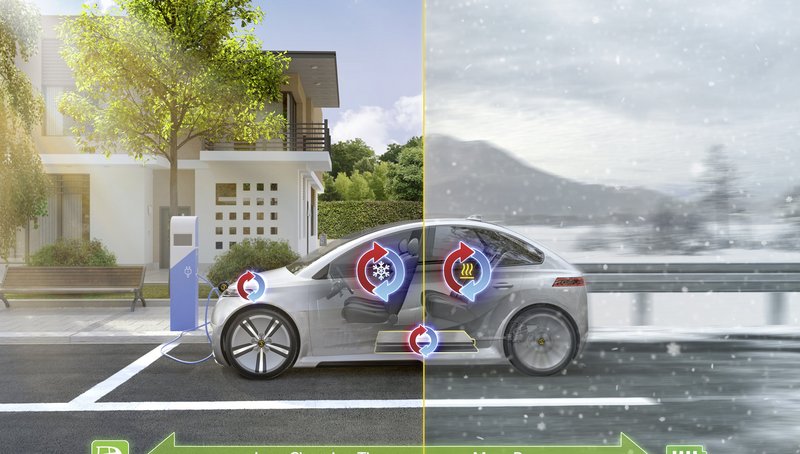Solutions for More Efficient Electromobility
- At the EVS32 Continental presents technology which extends the range of electric vehicles
- A new Thermal Management research vehicle is exhibited for the first time to demonstrate how managing heat intelligently can help to extend the range
- Artificial Intelligence (AI) is employed to design more efficient fuel cell systems
Lyon, Regensburg. May 21, 2019. As the general interest in electromobility and electric vehicles (EVs) is on the upswing, it is highly important to ensure that using an EV is practical on a day-to-day level. At the 32nd Electric Vehicle Symposium (EVS32, 20 May – 22 May) at Lyon (France) experts from the Continental powertrain business give presentations on innovations for a more efficient electromobility. Thermal Management on a system level, for instance, can help to achieve a considerably longer vehicle range despite cold or hot ambient temperatures. A research vehicle, based on an existing mid-size EV, is exhibited by Continental for the first time. Furthermore, solutions for fuel cell vehicles can provide an answer to long distance driving, especially for larger and commercial vehicles. Continental now utilizes Artificial Intelligence (AI) and the principle of swarm intelligence to design optimum fuel cell systems. The demand for higher power density in electronics, with greater power levels and more functions integrated into ever smaller packages will only increase, particularly for smaller EVs and plug-in hybrids. New semiconductor materials like gallium nitride (GaN) are potential solutions which enable such high integration, for example in bi-directional On-Board Chargers.
“Electric vehicles, hybrids and fuel cell vehicles will all be an integral part of the future mobility mix. As they offer a new experience to drivers, it is important to get the vehicle practicality right. This extends far beyond driving. To make electromobility a success we must also address the trickier bits, which can spoil the fun of driving, if left unattended”, said Stephan Rebhan, Head of Technology & Innovation Powertrain. “Thermal management and efficient charging rank high on that list because they can add to the usability of driving an EV.”
Making an EV more than a „fair-weather captain”
Every proud new EV owner is in for an eye opener when the first winter season approaches in the northern hemisphere: At below 0 °C temperatures the remaining range of the vehicle can be much smaller than at 20 °C. In the interest of usability, it is important to reduce this temperature-induced loss to a minimum. At Lyon Continental shows solutions to this challenge.
The Thermal Management research vehicle is equipped with specifically developed multi-port Coolant Flow Control Valves (CFCVs), coolant pumps and the newly developed Electro-Thermal Recuperator (ETR) or smart heater. Working together, these components harvest heat and energy where it originates in the vehicle and transport it to places where it is useful. By doing that the energy demand from the battery is reduced which increases range. Depending on the temperature level of core components such as the battery, the heat flow can be flexibly re-directed as needed. The smart heater, for instance, can help to either heat up the cabin or the battery when it is too cold for the battery to accept electric energy from recuperation (regenerative braking). For that purpose the smart heater will turn electricity into heat that is available for appropriate use. “In an EV both, human and machine, want to be in their comfort zone”, Rebhan said. “A car that is equipped with our smart heater, for instance, can achieve the comfort zone in a third of the time of a model without smart heater.”
New semiconductor material GaN as a potential solution for higher integration levels
Gallium nitride, due to its lower conduction and switching losses is a compelling technology for power electronics. For example, GaN in a bi-directional, air-cooled On-Board Charger enables charging efficiency of 95%, thus reducing charging times and increasing overall energy efficiency, which in turn improves the practicality of electrified vehicles.
Artificial Intelligence speeds up Fuel Cell system design
A Fuel Cell powertrain is rather complex to design: It consists of two electrochemical power sources (i.e. the fuel cell and battery) which are connected via at least one DC/DC link to the inverter and the electric motor. To get the maximum efficiency out of this powertrain one needs to find the best operating strategy and power split between FC and battery. The Powertrain Division is using AI and Pontryagin's Minimum Principle (PMP) optimization algorithms to compute the optimum fuel cell system and powertrain design for a known drive cycle. By harnessing its AI and swarm intelligence know-how the fuel cell experts were able to lower the energy losses in the battery-DC/DC link by around 3.5% through finding and applying intelligent control principles.

Simone Geldhäuser
Head of Media Relations, Spokesperson Finance, Business and Technology
Vitesco Technologies

